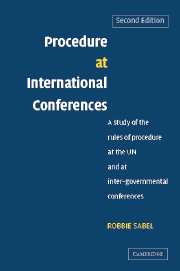 Procedure at International Conferences
Procedure at International Conferences Book contents
- Frontmatter
- Contents
- Preface to the second edition
- List of abbreviations and conference references
- Introduction
- 1 Historical development of rules of procedure of conferences and attempts to establish model rules
- 2 Adoption of rules of procedure
- 3 Rules of procedure and international law
- 4 Invitations, participation and credentials
- 5 Presiding officer and other officers of the conference
- 6 Meetings
- 7 Statements by delegations
- 8 Submission of proposals
- 9 Adjournment and closure of debate
- 10 Amendments
- 11 Withdrawal and reconsideration of motions
- 12 Procedural motions and points of order
- 13 Priorities between different proposals
- 14 Decision taking and method of voting
- 15 Majority required
- 16 Consensus
- 17 Separate votes
- 18 Conduct of voting – interruption of voting and correction of vote
- 19 Languages, records and documents
- 20 Committees
- 21 Suspension and amendment of rules of procedure
- Bibliography
- Index
19 - Languages, records and documents
Published online by Cambridge University Press: 22 July 2009
- Frontmatter
- Contents
- Preface to the second edition
- List of abbreviations and conference references
- Introduction
- 1 Historical development of rules of procedure of conferences and attempts to establish model rules
- 2 Adoption of rules of procedure
- 3 Rules of procedure and international law
- 4 Invitations, participation and credentials
- 5 Presiding officer and other officers of the conference
- 6 Meetings
- 7 Statements by delegations
- 8 Submission of proposals
- 9 Adjournment and closure of debate
- 10 Amendments
- 11 Withdrawal and reconsideration of motions
- 12 Procedural motions and points of order
- 13 Priorities between different proposals
- 14 Decision taking and method of voting
- 15 Majority required
- 16 Consensus
- 17 Separate votes
- 18 Conduct of voting – interruption of voting and correction of vote
- 19 Languages, records and documents
- 20 Committees
- 21 Suspension and amendment of rules of procedure
- Bibliography
- Index
Summary
Languages of the conference
Official languages
The UN Model Rules propose:
Rule 69
Languages of the Conference
Arabic, Chinese, English, French, Russian and Spanish shall be the languages of the Conference, unless the convening organ decides that not all these languages are required.
Rule 70
Interpretation
1. Speeches made in a language of the Conference shall be interpreted into the other such languages, unless such interpretation has not been requested by the representative of any State participating in the Conference.
2. A representative may speak in a language other than a language of the Conference if the delegation concerned provides for interpretation into one such language.
Rule 71
Languages of documents
1. Any reports submitted by the General Committee, a Main Committee or a Drafting Committee, as well as any report or final act of the Conference, shall be published in the languages of the Conference.
2. All resolutions and other formal decisions of the Conference shall be published in the languages of the Conference.
3. Treaty instruments adopted by a treaty-making conference shall be published in the languages in which they are authentic.
The UN Model Rules generally follow UNGA practice.
The number of official languages of conferences has been steadily increasing from the original French-only of nineteenth- and early twentieth-century conferences. Both French and English were official languages of the 1919 Paris Peace Conference and the League of Nations, then English, French and Russian were recognised at the 1946 Paris Peace Conference.
- Type
- Chapter
- Information
- Procedure at International ConferencesA Study of the Rules of Procedure at the UN and at Inter-governmental Conferences, pp. 395 - 407Publisher: Cambridge University PressPrint publication year: 2006


